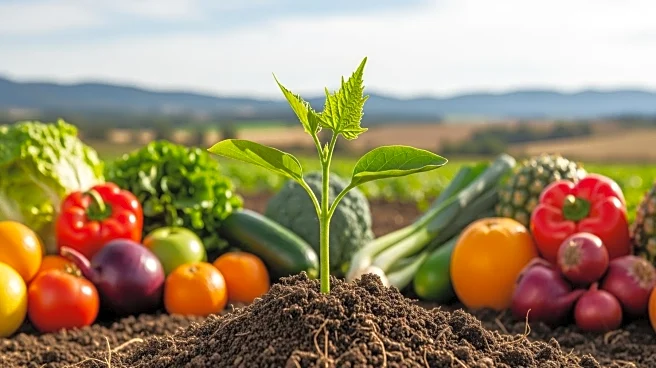What's Happening?
ICL Japan has introduced BIOZ Actijump, a biological inoculant for soybeans, developed in collaboration with Ukrainian biotechnology innovator BTU. This launch marks a significant advancement in sustainable agriculture practices. BIOZ Actijump is designed to improve crop yield and efficiency by enhancing the effectiveness of pesticides, herbicides, and fertilizers. Agricultural adjuvants, such as surfactants and wetting agents, play a crucial role in optimizing the performance of active ingredients in farming. The USA agricultural adjuvants market, valued at USD 206.21 million in 2022, is projected to grow at a compound annual growth rate (CAGR) of 5.14% from 2024 to 2031. Key players in this market include KALO, Inc., BASF SE, and Wilbur-Ellis Holdings, Inc., among others.
Why It's Important?
The introduction of BIOZ Actijump represents a pivotal step towards more sustainable agricultural practices, which are increasingly important in the face of environmental challenges. By improving the efficiency of crop protection products, this innovation can help reduce the environmental impact of farming and support biodiversity goals. The growth of the agricultural adjuvants market indicates a rising demand for products that enhance crop yield and efficiency, which is crucial for meeting the food needs of a growing population. Stakeholders in the agriculture industry, including farmers and agribusinesses, stand to benefit from these advancements through increased productivity and sustainability.
What's Next?
The agricultural sector is likely to see further innovations in biological crop inputs, driven by collaborations between biotechnology companies and agricultural firms. As the market for agricultural adjuvants continues to expand, more companies may invest in research and development to create products that align with sustainable farming practices. Additionally, field trials, such as those initiated by Grand Farm, will provide valuable data-driven insights and practical solutions to challenges faced by growers, potentially leading to more widespread adoption of these technologies.
Beyond the Headlines
The shift towards sustainable agriculture practices may have broader implications for global food security and environmental conservation. As more countries adopt these practices, there could be a significant reduction in the use of synthetic chemicals in farming, leading to healthier ecosystems and improved soil health. This transition may also influence regulatory policies and encourage further investment in green technologies within the agricultural sector.









